M. Fink
Time Reversal for Multiple Access and Mobility: Algorithmic Design and Experimental Results
Mar 29, 2022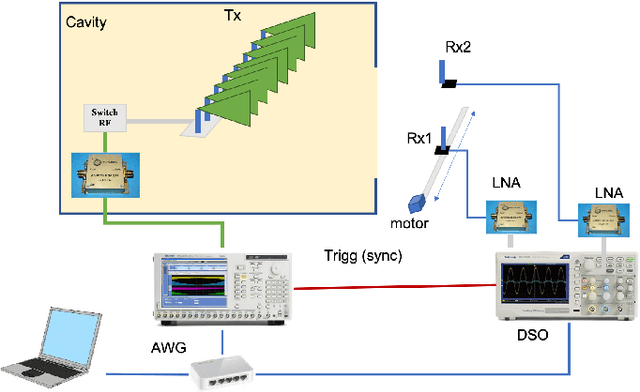
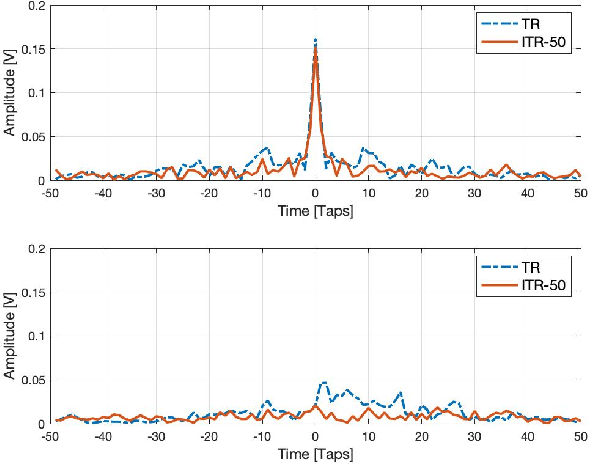
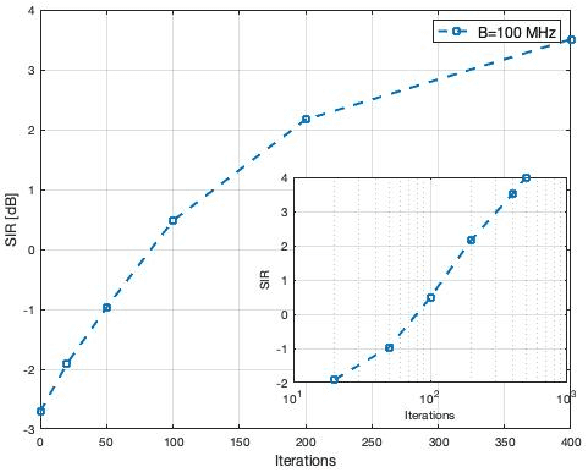
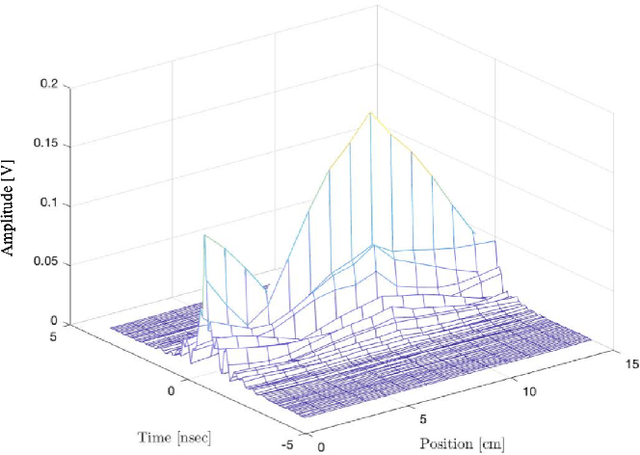
Abstract:Time Reversal (TR) has been proposed as a competitive precoding strategy for low-complexity wireless devices relying on Ultra-WideBand (UWB) signal waveforms. However, when TR is applied for multiple access, the signals received by the multiple users suffer from significant levels of inter-symbol and inter-user interference, which requires additional processing for mitigation by each receiving user. In this paper, we present an iterative Time-Reversal Division Multiple Access (TRDMA) approach that aims to dim the latter interference levels. The performance of iterative TRDMA is evaluated experimentally in a reverberation chamber that mimics a rich scattering indoor wireless propagation environment. The improved efficiency, in terms of the number of algorithmic iterations, of the proposed approach compared to conventional TRDMA, is demonstrated. We also consider a mobile user configuration, where the position of the receiver changes between the channel estimation and data transmission steps. It is showcased, even for this experimental setup, that the proposed iterative TRDMA approach is more efficient than conventional precoding schemes.
Reasoning about Evolving Nonmonotonic Knowledge Bases
Sep 16, 2002
Abstract:Recently, several approaches to updating knowledge bases modeled as extended logic programs have been introduced, ranging from basic methods to incorporate (sequences of) sets of rules into a logic program, to more elaborate methods which use an update policy for specifying how updates must be incorporated. In this paper, we introduce a framework for reasoning about evolving knowledge bases, which are represented as extended logic programs and maintained by an update policy. We first describe a formal model which captures various update approaches, and we define a logical language for expressing properties of evolving knowledge bases. We then investigate semantical and computational properties of our framework, where we focus on properties of knowledge states with respect to the canonical reasoning task of whether a given formula holds on a given evolving knowledge base. In particular, we present finitary characterizations of the evolution for certain classes of framework instances, which can be exploited for obtaining decidability results. In more detail, we characterize the complexity of reasoning for some meaningful classes of evolving knowledge bases, ranging from polynomial to double exponential space complexity.
On Properties of Update Sequences Based on Causal Rejection
Sep 05, 2001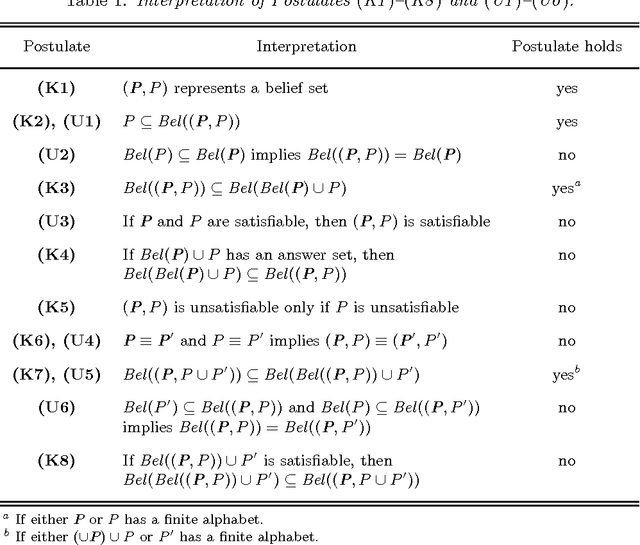

Abstract:We consider an approach to update nonmonotonic knowledge bases represented as extended logic programs under answer set semantics. New information is incorporated into the current knowledge base subject to a causal rejection principle enforcing that, in case of conflicts, more recent rules are preferred and older rules are overridden. Such a rejection principle is also exploited in other approaches to update logic programs, e.g., in dynamic logic programming by Alferes et al. We give a thorough analysis of properties of our approach, to get a better understanding of the causal rejection principle. We review postulates for update and revision operators from the area of theory change and nonmonotonic reasoning, and some new properties are considered as well. We then consider refinements of our semantics which incorporate a notion of minimality of change. As well, we investigate the relationship to other approaches, showing that our approach is semantically equivalent to inheritance programs by Buccafurri et al. and that it coincides with certain classes of dynamic logic programs, for which we provide characterizations in terms of graph conditions. Therefore, most of our results about properties of causal rejection principle apply to these approaches as well. Finally, we deal with computational complexity of our approach, and outline how the update semantics and its refinements can be implemented on top of existing logic programming engines.
Using Methods of Declarative Logic Programming for Intelligent Information Agents
Aug 14, 2001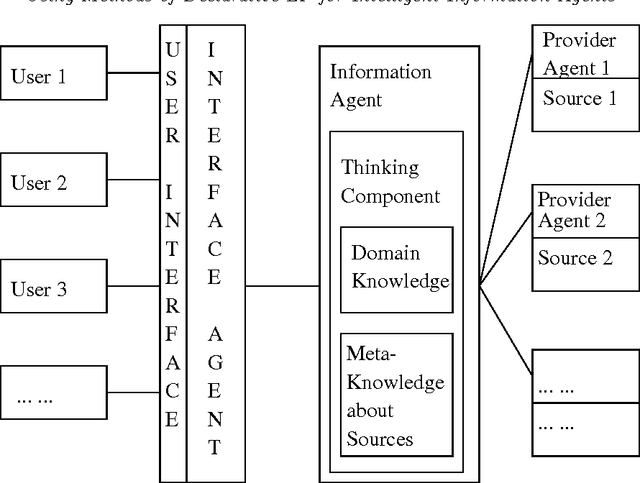
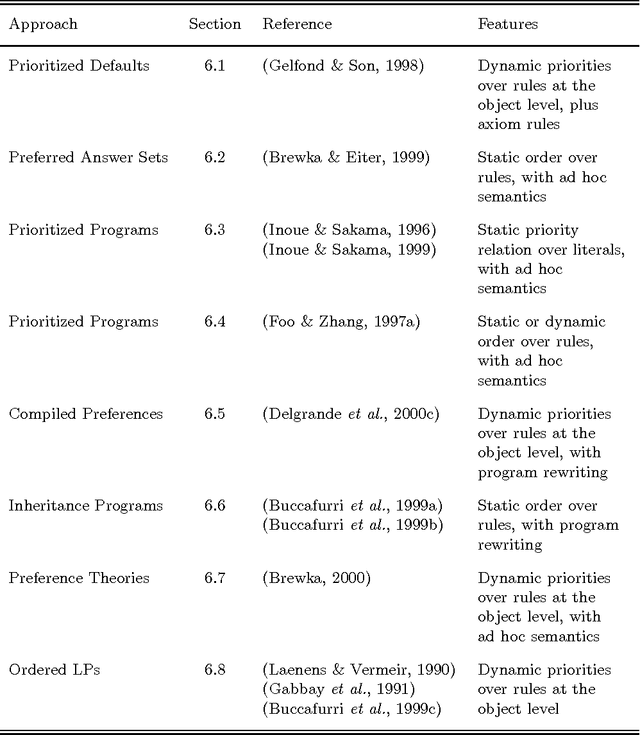
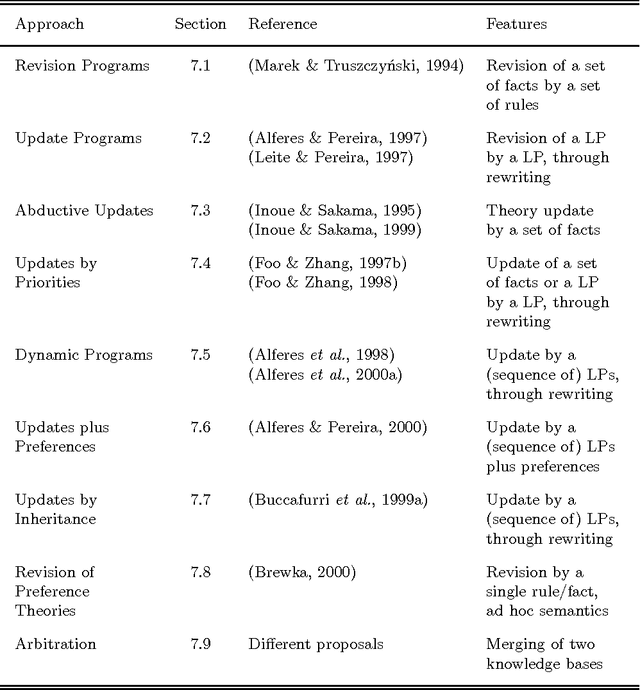
Abstract:The search for information on the web is faced with several problems, which arise on the one hand from the vast number of available sources, and on the other hand from their heterogeneity. A promising approach is the use of multi-agent systems of information agents, which cooperatively solve advanced information-retrieval problems. This requires capabilities to address complex tasks, such as search and assessment of sources, query planning, information merging and fusion, dealing with incomplete information, and handling of inconsistency. In this paper, our interest is in the role which some methods from the field of declarative logic programming can play in the realization of reasoning capabilities for information agents. In particular, we are interested in how they can be used and further developed for the specific needs of this application domain. We review some existing systems and current projects, which address information-integration problems. We then focus on declarative knowledge-representation methods, and review and evaluate approaches from logic programming and nonmonotonic reasoning for information agents. We discuss advantages and drawbacks, and point out possible extensions and open issues.
 Add to Chrome
Add to Chrome Add to Firefox
Add to Firefox Add to Edge
Add to Edge